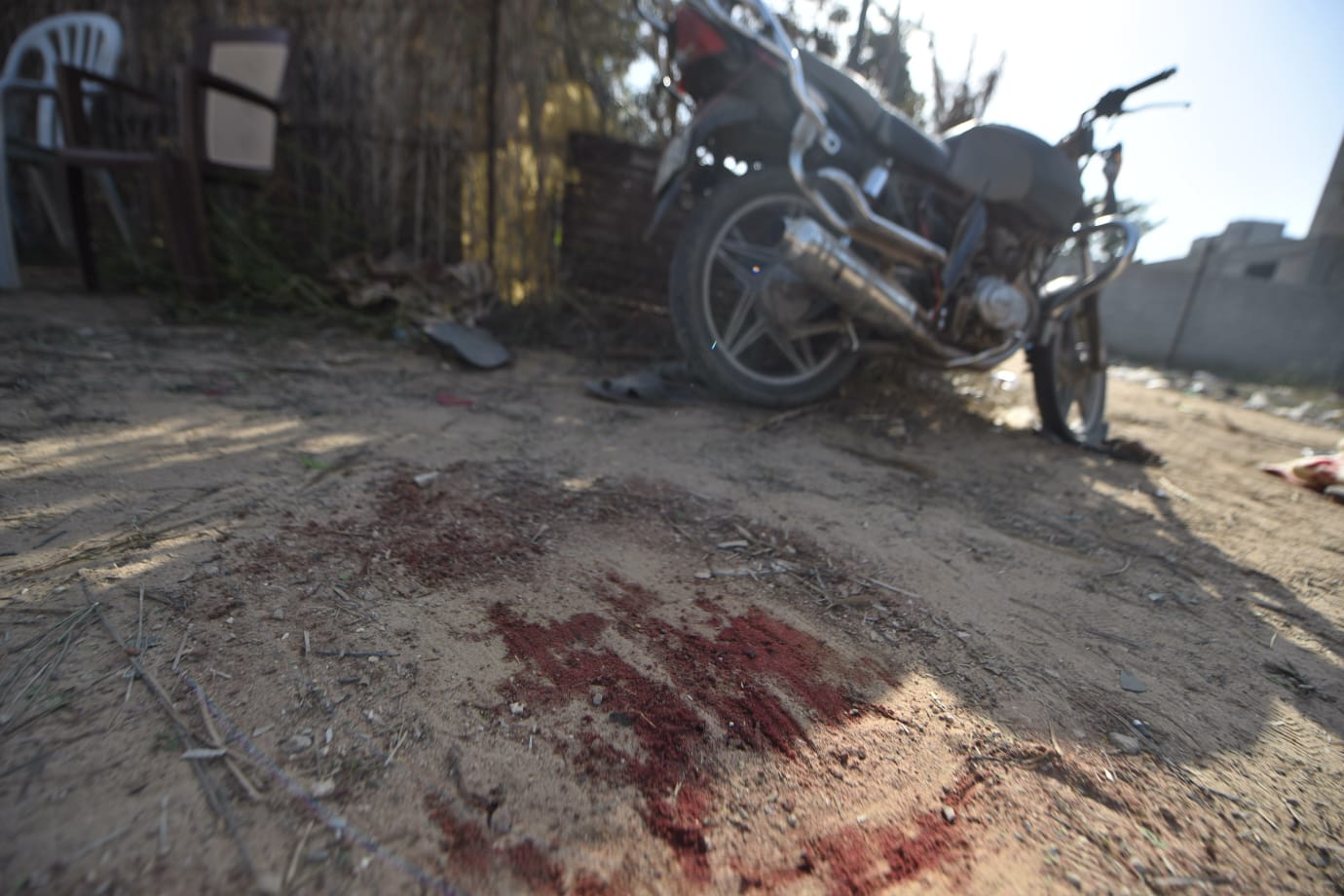Palestinian family among dozens killed in Israel's onslaught on Gaza Strip

Raafat Ayyad and his two young sons, Amir and Islam, were in front of their home in the Gaza Strip on Wednesday when Israeli warplanes killed them in an onslaught that has left more than two dozen Palestinians dead within two days.
Israel unleashed an air campaign on Gaza after it assassinated senior Islamic Jihad commander Bahaa Abu al-Atta and his wife on Tuesday morning.
The armed group retaliated by launching salvoes of rockets into Israel and pledging to keep up its attacks.
At least 32 Palestinians have been killed in two days of Israeli air strikes, according to local medical sources, while 71 others, including 30 children, have been wounded.
Six people were killed in central Gaza's Deir al-Balah during a pre-dawn strike on Thursday, including a woman and a child, Reuters reported citing local medics.
Stay informed with MEE's newsletters
Sign up to get the latest alerts, insights and analysis, starting with Turkey Unpacked
In eastern Gaza on Wednesday, Ayyad, a 54-year-old farmer, and Amir, 8, were returning home from the farm on a motorcycle when they stopped to greet Islam, 25.
Moments later, an air strike killed the Ayyad family members in front of their house in al-Tuffah neighbourhood
The bodies of other Palestinian victims were brought to Gaza City's Shifa hospital in taxis and ambulances, witnesses said.
Relatives gathered outside the Quds and Shifa hospitals and many could be seen weeping and screaming.
Ashraf al-Qudra, the spokesman for Gaza's health ministry, said the ministry had raised its level of preparedness in the emergency and intensive-care units since the start of the Israeli military operation in Gaza.
"Our medical staff have dealt with difficult cases, including severe burns, complex fractures and deep wounds," he told MEE, adding that most of the wounded were suffering from moderate to serious injuries.
Qudra accused the Israeli military of using excessive force in its attacks, citing the charred and torn bodies of several victims.
All the ministry's medical facilities, including clinics and health-care centres, will be open during this time to treat what is expected to be a high number of casualties, Qudra said.
Medics and witnesses said most of the victims have been civilians who lived in densely populated neighbourhoods.
Palestinians in Gaza have suffered through three wars between 2008 and 2014.
Israel's massive military air campaign on Gaza in 2014 killed at least 2,220 Palestinians, mostly civilians, according to the United Nations, and residents are still reeling from the extensive destruction Israel inflicted throughout the besieged territory.
Khalid Dader, 65, said he does not want the Israeli military campaign to escalate further. Palestinians, he said, have not yet forgotten the pain Israel inflicted on them in previous offensives.
"I think, if the Israeli occupation does not stop its air strikes, the Palestinian resistance must use all power it has in order to deter it," he said.
Egyptian mediation
The Joint Operation Room, a coordination unit between the military wings of various Palestinian factions, said in a statement on Wednesday that it would continue firing rockets on Israeli targets in retaliation for Abu al-Atta's assassination.
"We will not let Israel attack a certain Palestinian faction and stay put," the statement said.
A Hamas movement source with knowledge of the discussions told Middle East Eye that Egyptian intelligence has been leading mediation efforts to end the escalation since Tuesday morning.
'The ceasefire is in the Egyptian mediators' hands, who should put as much pressure as possible to stop the Palestinian rockets and the Israeli air strikes'
- Saleh al-Naami, analyst
"The Egyptians have passed a message from Israel to the Palestinians saying that Israel does not want to escalate the situation, and Israel does not have any conditions except stopping the firing of rockets from the Gaza Strip," the source said.
But no breakthrough has been reached yet, and Palestinian factions want international supervision over any possible deal between them and Israel.
Saleh al-Naami, a Palestinian analyst, told MEE that Hamas is not interested in a war with Israel.
"The ceasefire is in the Egyptian mediators' hands, who should use as much pressure as possible to stop the Palestinian rockets and the Israeli air strikes.
"Israel did not thoroughly calculate the situation when it gave the green light to carry out the assassination," Naami added.
Later on Wednesday, a spokesman for Palestinian Islamic Jihad said "important political developments" are to be expected.
In an interview with Al-Mayadeen TV, Islamic Jihad leader Zeyad al-Nakhala said the group had offered terms for an Egyptian-mediated ceasefire with Israel, Reuters reported.
Nakhala said the terms included Israel halting its targeted killings and lethal responses to Gaza's weekly March of Return protests, as well as measures to ease the Israeli blockade of the Palestinian enclave.
The Israelis attacked the house of Abu al-Atta, the group's 42-year-old commander in the northern Gaza Strip, and his wife, Asmaa, 39.
Islamic Jihad announced that Akram al-Ajouri, a member of its political bureau, had survived an Israeli attack on his house in the Syrian capital Damascus on Tuesday - but that his son and a number of his bodyguards were killed.
Hours after the Israeli army announced it had assassinated the Islamic Jihad commander, Prime Minister Benjamin Netanyahu said that Israel does not want to escalate tensions with Gaza.
The Israeli military on Wednesday reinforced its forces along the Gaza separation fence, according to Israeli media reports.
Hundreds of reserve soldiers were called up, including members of the Iron Dome missile defence units, military intelligence and the Home Front Command.
Middle East Eye delivers independent and unrivalled coverage and analysis of the Middle East, North Africa and beyond. To learn more about republishing this content and the associated fees, please fill out this form. More about MEE can be found here.






